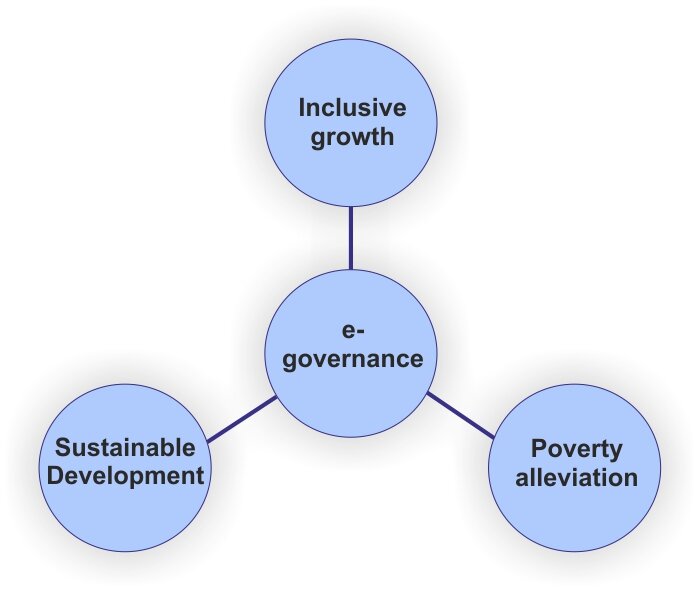- Filter By :
- Polity & Governance
- International Relations
- Social Justice
-
Q. Explain how e-governance can facilitate economic inclusiveness and bring social transformation in India. (250 words)
17 Sep, 2019 GS Paper 2 Polity & GovernanceApproach
- Introduce by defining and linking e-Governance and inclusive growth.
- Give examples of e-Governance initiatives with socio-economic dimensions.
- Conclude by mentioning the need for citizen-centric governance.
Introduction
- E-Governance is the application of Information and Communication Technology (ICT) to the processes of government functioning in order to bring about ‘Simple, Moral, Accountable, Responsive and Transparent’ (SMART) governance.
- This SMART governance model should lead to inclusive growth that creates opportunity for all segments of population and distributes the dividends of increased prosperity fairly across society. Thus, e-Governance helps in socio-economic development and sustainable growth for all.
Body
Following are the applications of e-governance which illustrate economic inclusiveness in bringing social transformation in Indian society:
Economic dimensions
- Reviving agriculture sector:
- Digitization of land records via Bhoomi Rashi portal.
- Geographic Information Systems (GIS) has helped improve productivity, and empowered farmers by using sustainable, economical and eco-friendly technology.
- Financial literacy and inclusion:
- PMGDISHA (Pradhan Mantri Gramin Digital Saksharta Abhiyan) to make atleast one person per family digitally literate.
- Aadhaar Enabled Payment System (AEPS) facilitates banking services and digital payment.
- Digital payment: Many innovative digital payment tools, namely BHIM-UPI, Bharat QR Code, National Electronic Toll Collections, etc, have been implemented.
- Quality employment:
- UMANG mobile application for availing government services through backend integration with several government application and databases.
- Digitization of EPFO records : access to view one’s pension amounts and deposits, people feel more assured that their funds are safe and can monitor their fund status.
Social dimensions
- Affordable education:
- National Scholarship Portal as a single online platform integrating multiple scholarship schemes to facilitate application submission, verification and disbursal of funds through Direct Benefit Transfer (DBT).
- SWAYAM – a massive online open courses (MOOCs) platform which offers more than 2000 programmes.
- ‘National Knowledge Network (NKN) to interconnect all institutions of higher learning and research with a high speed data communication network to facilitate knowledge sharing and collaborative research.
- Quality Healthcare:
- e-Hospital : facilitates automation in hospitals through 20+ modules of Hospital Management Information System namely patient registration, IPD, pharmacy, blood bank, etc.
- `Mera Aspataal’ Application : Allows patients to provide feedback on service quality at hospitals and ultimately help establish patient driven, responsive and accountable healthcare system.
- Inclusion of marginalized sections:
- Non-visual display access (NVDA), an open source screen reading software, available in 7 Indian languages facilitates the differently abled to access services.
- Jeevan Pramaan facilitates pensioners to submit their life certificate digitally from anywhere, anytime basis.
- Facilitating participatory governance/ Resolving citizens grievances:
- MyGov portal facilitates participatory governance by providing a common digital platform, where citizens can share their views on government programmes and schemes.
- Real Time Governance initiative of Andhra Pradesh government to resolve citizen grievances and monitor infrastructure projects, incidents and weather & climatic events across the state in real time, leveraging technology services.
Thus, e-governance can facilitate economic inclusiveness and bring social transformation in India.
Conclusion
Digital India programme helped India harness digital technologies to bring about a positive change towards good governance. The aim of any e-Governance initiative should be to ensure citizen participation and empowerment with the technology that is transformative, affordable and sustainable. Thus, digital empowerment is necessary to achieve the motto of ‘Maximum Governance, Minimum Government’.
To get PDF version, Please click on "Print PDF" button.
Print PDF





